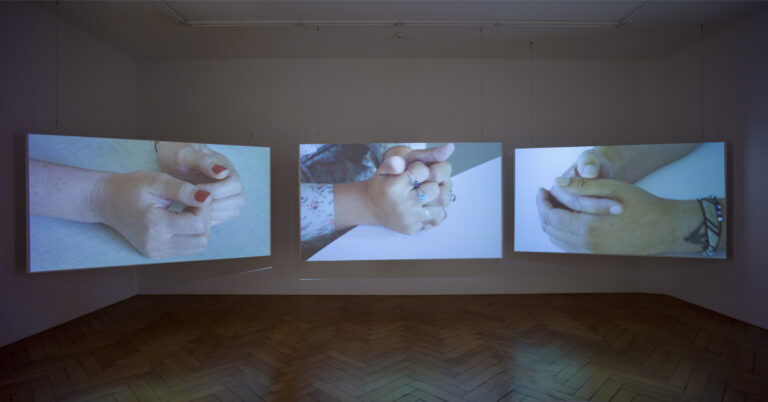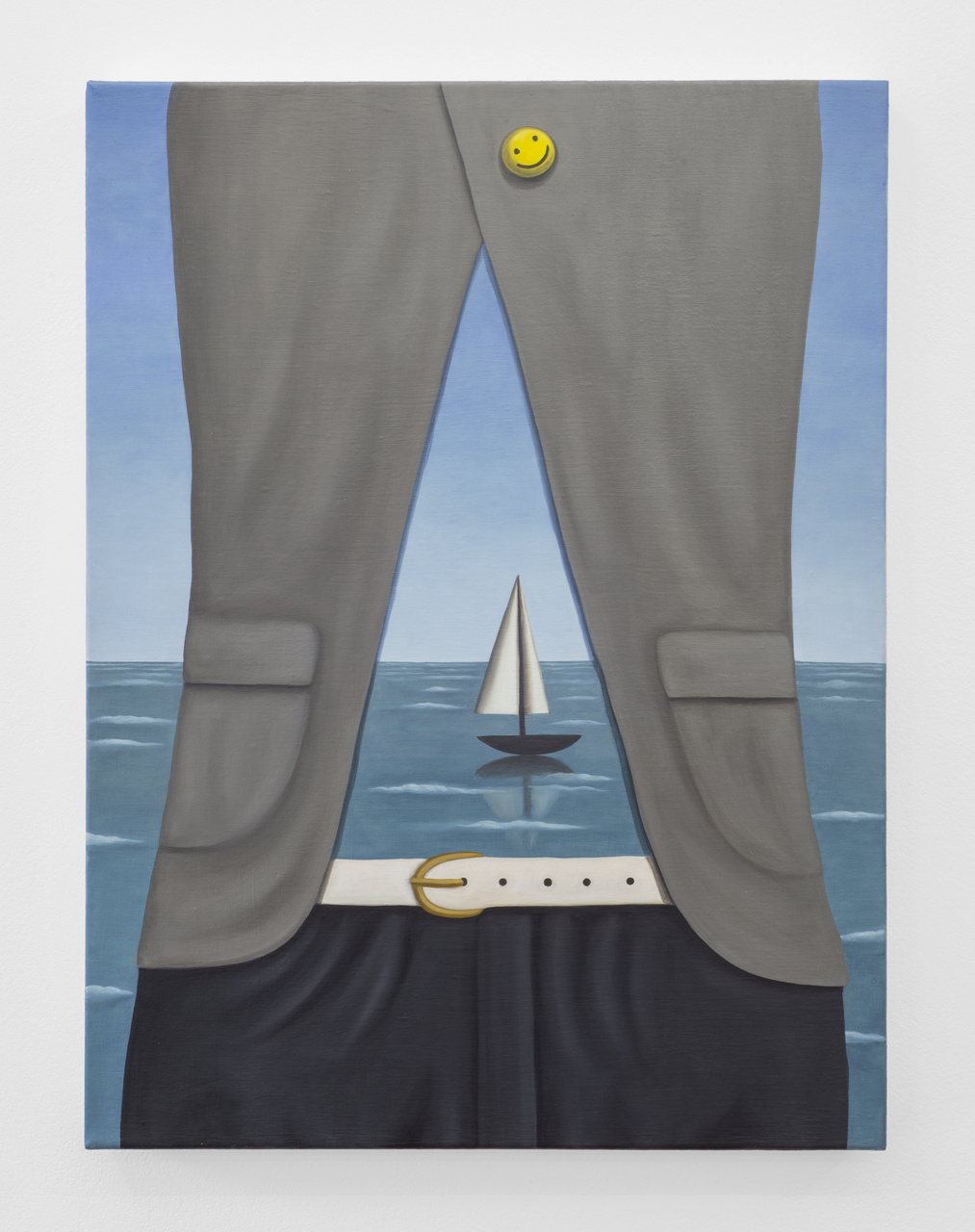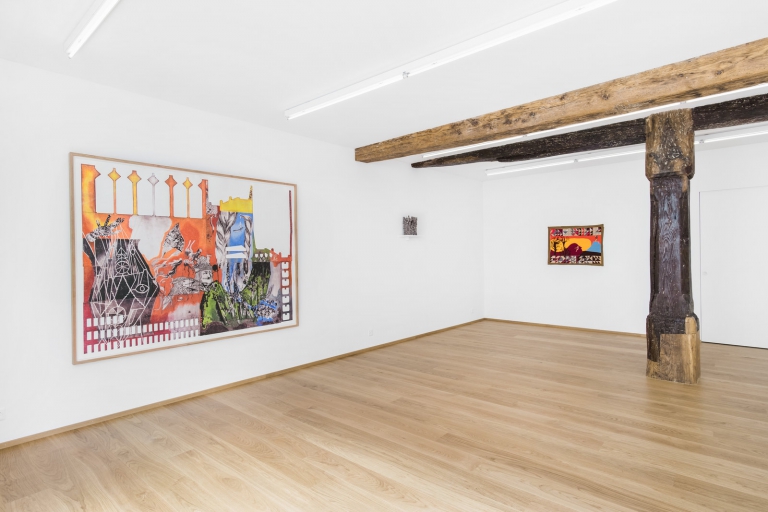Giulia Essyad uses her body as both an investigative tool and a physical projection surface, immersing it in fantastical cinematic universes inspired by medieval legends, pop culture and cyborg aesthetics. This composite, hybrid, technological body enables her to escape binary gender classification. Through ultra-sensuality and glamour, and an over-determination of the codes of extreme femininity, Essyad invites viewers to critically deconstruct self-representation and the contemporary body. The body becomes a militant, iconic vector, released from taboos, canons and aesthetic stereotypes, a means of breaking free from essentialist, naturalist tendencies and simplistic dichotomies such as nature/culture, man/woman, human/animal, etc.
In a very free, syncretic style, the artist articulates concepts that range from animism to polytheism, by way of fantasy. She draws on a vast, multicultural range of natural and supernatural phenomena, myths and more traditional, ancient beliefs. In this multifaceted universe, which is simultaneously digital and archaic, the artist creates avatars of herself, metamorphosed into marketing material worthy of the most over-produced advertisements. They oscillate between an amused, assertive animality and a sophistication that would make digital or Hollywood sisters of Ann Lee or Betty Boop, ancient nymphs or modern mermaids. These dolls are transformed into warriors, their bodies liberated from imposed norms and the codes of classical beauty.
This is not Giulia Essyad’s first collaboration with the Centre d’édition contemporaine. In 2015 and 2016, she presented two readings on the occasion of the exhibition of the collective sound edition Artists’ Voices produced in 2016, made up of three vinyls: a poem, Poetry Reading December 2016, and a text, Prophecy Podcast 1. In 2022, the CEC edited Blueberry Studies. Before publication 8, part of the Before publication collection linked to the catalogue L’Effet papillon, 2008-2025, as well as a print, temple-piss19-psd, 2020, an edition offered to members of the CEC association in 2022.
Giulia Essyad is presenting a new body of work specially produced for the INNARDS exhibition, as well as a new edition, Unspeakable (I’m ready), 2023-2024. The latter consists of photographic reproductions of a series of nude images taken as part of a Pro Helvetia residency in Bengaluru, India, in 2022. Unspeakable (I’m ready) includes five photographs of the artist experimenting on herself with the Japanese bondage technique known as shibari. This sexual practice became popular in Japan in the 1950s, before gradually becoming an “art” performed by masters whose techniques were exported and popularised in the West. Giulia Essyad reinterprets them in a more personal and empirical way, for example in the performance Rosabel… BELIEVE (Perrrformat, Zurich, 2022).
From a technical point of view, these photographs are black-and-white reproductions of images that were produced using the wet collodion process,1 in postcard format, on thin sheets of Plexiglas. Sixty-five of these reproductions were individually wrapped in transparent plastic boxes and packaged like computer products, before being bound together with an elastic band in groups of five photographs, each of them constituting an edition, itself produced in 8 labelled and numbered copies, 2 H.C. and 3 e.a.
The Unspeakable (I’m ready) edition, like a pack of nudes for sale, is presented in a display inspired by the layouts of electronics stores. The exhibition space calls to mind the interior of a mobile phone shop: in the centre of the room, several phones are laid out on a table. These are actually little cobbled-together lightboxes: DIY objects made from hot glue and salvaged phone cases, rudimentary reproductions of these communication tools. Essyad’s imitations of these indispensable everyday objects are deliberately jerry-built, but jubilantly so. Smartphone cases are transformed into substrates, the exclusive backdrops for her self-portraits, her stagings of herself and her character: low-tech showcases for a body that is both deconstructed and augmented, uninhibited, futuristic and cyborg-like. For Essyad, IT tools (telephones, USB cables) and terminology (RAM, external hard drives) are metaphors for the human body, its venous and nervous systems, its memory, brain and entrails (INNARDS).
The artist, herself a central figure in this provocative, no-holds-barred body of work, offers an alternative to the dictates of a perfect physique, exposing the nudity of a body that oversteps the norms imposed by contemporary society, social networks and unattainable standards. Giulia Essyad humorously turns these tools of ultra-communication to her advantage by modifying them in a deliberately sloppy way. She mocks them, attempts to destroy them from within, well aware that it is almost impossible to free oneself completely from them.
Her overexposed, hypersexualised character claims a right to difference and self-determination, as a means of being totally oneself through a joyful, exuberant theatricality. She plays with the products of over-communication and over-information, in a world that claims to be totally transparent whilst paradoxically producing a double bind of coercion, control and intolerance.
Giulia Essyad is a Swiss artist, born in Lausanne in 1992, who lives and works in Geneva. Her work has been exhibited in solo shows in various venues in Switzerland and abroad: INNARDS, CEC, Geneva (2024); Tunnel Vision III, Tunnel Tunnel, Cinema Bellevaux, Lausanne (2023); Chocolate Factory, Cherish, Geneva (2020) ; Blue Period, Lokal Int, Bienne (2020); A Selene Blues, Fri Art Kunsthalle, Fribourg (2020); Herstory, Tunnel Tunnel, Lausanne (2016); Faces of the Goddess, Quark, Geneva (2016); Immortality, Forde, Geneva (2015); Hunter, MJ Gallery, Geneva (2014). She has also taken part in numerous group exhibitions: Bourses de la Ville de Genève 2024, Centre d’art contemporain, Geneva (2024); Of Bodies in Digital Life, Kunsthaus, Langenthal (2024); Swiss Media Art – Pax Art Awards, HeK, Basel (2024); Swiss Art Awards, BAK, Basel (2023); Jane of All Trades, Schmorévaz, Paris (2023); A performer’s misfits, Oxyd, Winterthur (2023); Ja, wir kopieren, Kunstmuseum Solothurn, Solothurn (2023); Prix Mobilière, Art Geneva, Geneva (2023); Claustrophobia Alpina, curated by Varun Kumar, Forde, Geneva (2022); Unbetrauerbar, For, Basel (2022); Biennale de l’Image en Mouvement, CAC, Geneva (2021); Octobre Numérique: Faire Monde, Pays d’Arles (2021); Fotoromanza, Le Commun, Geneva (2021); Contrology, Kunsthaus Riehen, Basel (2021).
[1] Wet collodion is a photographic technique dating from 1860, made famous by the photographer Eadweard Muybridge, the precursor of chronophotography.



























